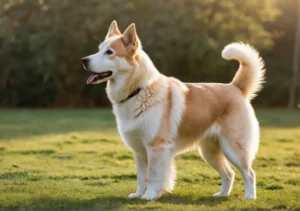Imagine you’re enjoying a peaceful evening cuddle with your furry friend when suddenly, a waft of hot breath hits you. No, it’s not a new doggy breath mint trend you missed out on; it’s your pup’s reality.
In this post, we promise you an exploratory journey into the hot breath phenomenon of dogs, assuaging your concerns, and outlining when it might be time to consult a vet.
Key takeaways:
- Dogs’ hot breath can be normal after exercise or in hot weather; observe if it persists.
- Regular dental care and monitoring diet can prevent many causes of hot breath.
- See a vet if hot breath is accompanied by other symptoms or doesn’t improve with home care.
Is It Normal for My Dog’s Breath to Be Hot?
Ever leaned in for a cuddle with your furry friend and noticed their breath feels like a mini heater? You’re not alone. Many dog owners observe this phenomenon and wonder whether they should be concerned. Before you jump to conclusions, let’s unpack the facts.
Generally, a dog’s breath might feel warmer due to utterly benign reasons such as recent exercise or hot weather. Yes, just like us, after a good run around the park or on a particularly sweltering day, your dog may exhibit warmer-than-usual breath. This is mostly due to the increased rate of respiration and body heat. So, in cases like these, it’s just their body’s natural way of coping with the excess heat.
However, it’s not always just about the temperature or physical activity. Sometimes, what they’ve eaten – especially warm or spicy food – can temporarily heat their breath. Most of the time, this is normal and not a sign of any underlying health issue.
What Causes Hot Breath in Dogs?
Moving beyond the harmless reasons, there are instances when hot breath can signal something more concerning. Let’s delve into some of the health-related causes behind your canine’s fiery exhalations:
-
Dental problems : One of the most common culprits behind hot breath is dental or gum disease. Plaque buildup, tooth decay, and gingivitis can lead to infections that may not only make your dog’s breath hot but also quite foul.
-
Infections : Respiratory or systemic infections can elevate your dog’s temperature and, subsequently, the warmth of their breath. From the nose and throat to the lungs, infections in these areas can make breathing feel hotter to the touch.
-
Metabolic disorders : Conditions like diabetes can alter your dog’s breath, making it not only smell different but also feel warmer. This is due to the body’s struggle to regulate blood sugar levels, affecting overall metabolism and, consequently, breath temperature.
One unique aspect often overlooked is the role of dehydration in affecting your dog’s breath temperature. A dehydrated dog might exhibit warmer breath as their body tries to cool down through panting, which, in the absence of sufficient moisture, might result in hotter exhalations.
How Can I Tell If My Dog’s Hot Breath Is a Problem?
Recognizing when hot breath is a red flag involves observing contextual signs. Here are practical tips to discern whether a vet visit might be in order:
-
Monitor other symptoms : Besides hot breath, do you notice any lethargy, excessive drooling, loss of appetite, or unusual behavior? These can be telltale signs of underlying health issues.
-
Check the gums : Healthy gums should be pink, not too red or pale. Redness or swelling, coupled with hot breath, may point towards dental issues.
-
Sniff out the odor : While dog breath isn’t known for being minty fresh, an unusually foul or sweet smell accompanying the warmth can indicate infections or metabolic disorders.
-
Stay hydrated : Ensure your dog is drinking enough water, especially on hot days or after exercise. Dehydration could heat up their breath, so maintaining proper hydration is key.
Remember, while it’s great to be observant, nothing beats professional advice. If your dog’s hot breath is accompanied by other concerning symptoms, it’s time to contact your vet. Early intervention can make a world of difference in ensuring your furry pal’s health and happiness.
Wrapping up this section, recognizing when your dog’s hot breath is a natural occurrence or a sign of something more serious is crucial. Keeping an eye on additional symptoms and staying informed about your dog’s health will help you better care for your four-legged friend. Stay tuned for more insights on keeping your dog healthy and happy.
What Can You Do to Help Your Dog?
Discovering that your dog’s breath feels hotter than usual can be startling. However, there’s a bounty of steps you can take to soothe your friend’s fiery breath and possibly pinpoint the issue. Start by evaluating your dog’s routine and environment to make sure they’re getting what they need for optimal health.
Stay on Top of Hydration
Ensuring your dog stays well-hydrated is crucial. Dogs, much like humans, need a sufficient amount of water to keep their body temperature regulated and their mouth moist, which can help cool down hot breath. Make sure your furry pal has constant access to clean, fresh water. Consider adding a few ice cubes to their water bowl on especially warm days to provide some extra cooling.
Maintain Oral Health
An often-overlooked aspect of a dog’s health is their oral hygiene. Plaque, tartar build-up, and gum disease can not only cause bad breath but may also result in a warmer breath due to infection or inflammation. Regular teeth brushing with a dog-specific toothpaste and routine dental check-ups can go a long way. Additionally, dental chews and toys designed to clean teeth can be a great supplement to brushing.
Watch the Diet
What your dog eats plays a significant role in their overall health and can directly affect their breath. Foods that are high in carbohydrates can lead to plaque accumulation and bad breath. Opt for high-quality dog food that’s balanced and right for your dog’s age, size, and any specific health needs.
Ventilation and Cooling
On those dog days of summer, ensure your pet has a cool, ventilated spot to lay their head. Overheating can cause dogs to pant more, possibly making their breath feel hotter to the touch. Indoor fans, cooling mats, and ensuring they have a shady spot when outdoors can help keep their temperature down.
Unique Tip: Frozen Treats
Here’s a tip that might not be on every dog owner’s radar: Make homemade frozen treats by freezing dog-friendly ingredients like peanut butter, yogurt, or chicken broth in an ice cube tray. Not only are these a great way to cool down your dog’s body (and consequently their breath), but they also provide a fun and enriching activity for your dog.
When Should You See a Vet?
While at-home care can handle many cases of hot breath, there are instances where only professional medical advice will do.
Persistent Hot Breath
If your dog’s breath remains unusually hot for more than a day or two without any improvement from at-home care, it’s time to call the vet. Persistent hot breath could be a sign of a deeper issue that needs medical attention.
Accompanied by Other Symptoms
Keep an eye out for other concerning symptoms accompanying your dog’s hot breath. These can include excessive drooling, lethargy, vomiting, or a refusal to eat. Such signs could indicate oral health issues, infections, or other serious conditions that require immediate veterinary care.
Dental Concerns
Should you notice any swelling, bleeding, or bad odor from your dog’s mouth, along with the hot breath, it could be a sign of dental disease. Veterinary intervention is crucial here to address any dental issues and possibly prevent more severe health problems.
Uncharacteristic Behavior
Lastly, pay attention to any uncharacteristic behavior in your dog, such as aggression when their mouth or head is touched. This could be their way of telling you something’s wrong, and a professional examination is necessary.
In essence, while some instances of hot breath can be addressed with diligent at-home care and a bit of TLC, don’t hesitate to seek veterinary advice if your dog’s symptoms persist or worsen. After all, our furry friends rely on us to keep them healthy and happy, and sometimes that means calling in the experts.
Alex, a passionate animal lover, has experience in training and understanding animal behavior. As a proud pet parent to two dogs and three cats, he founded AnimalReport.net to share insights from animal experts and expand his knowledge of the animal kingdom.





